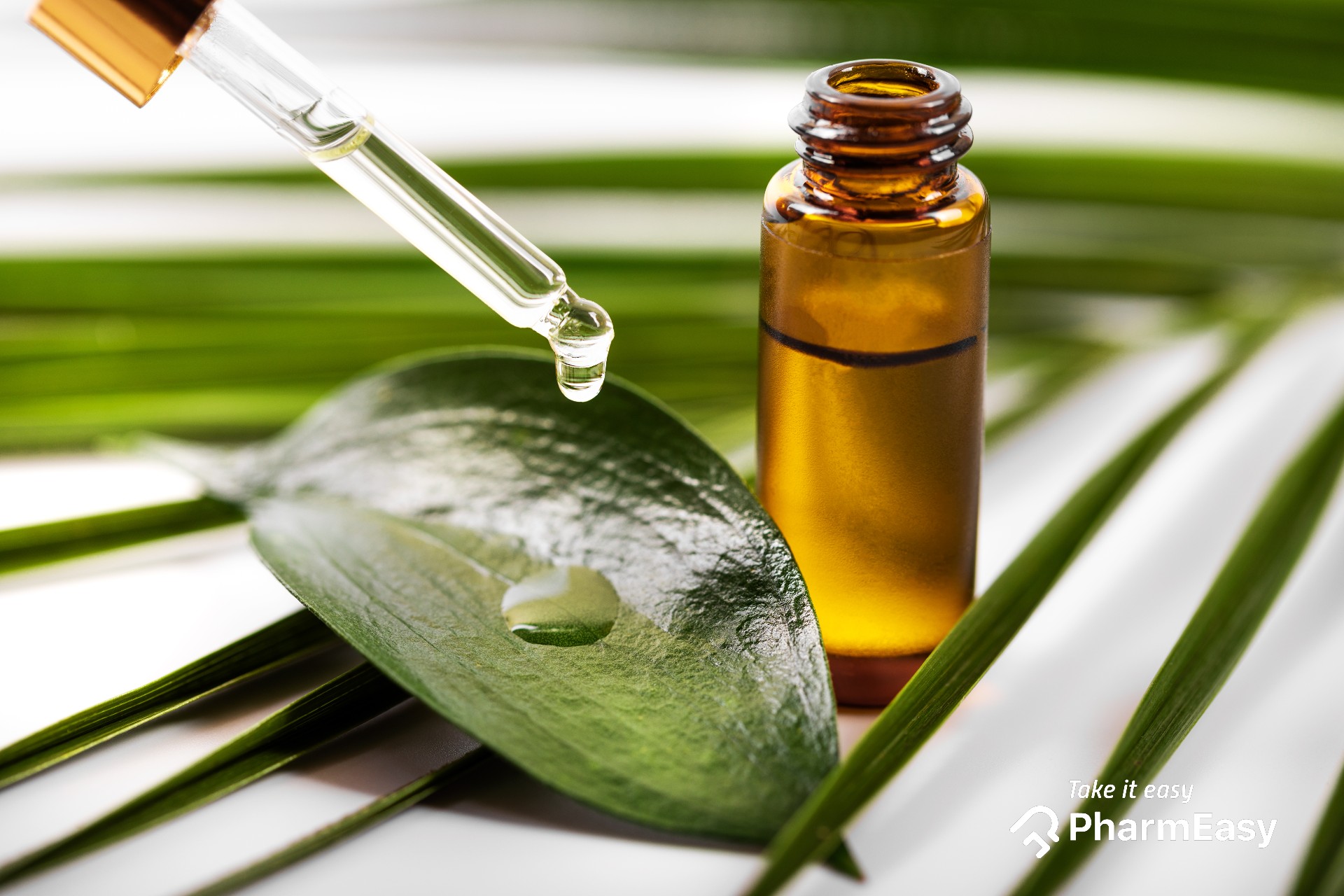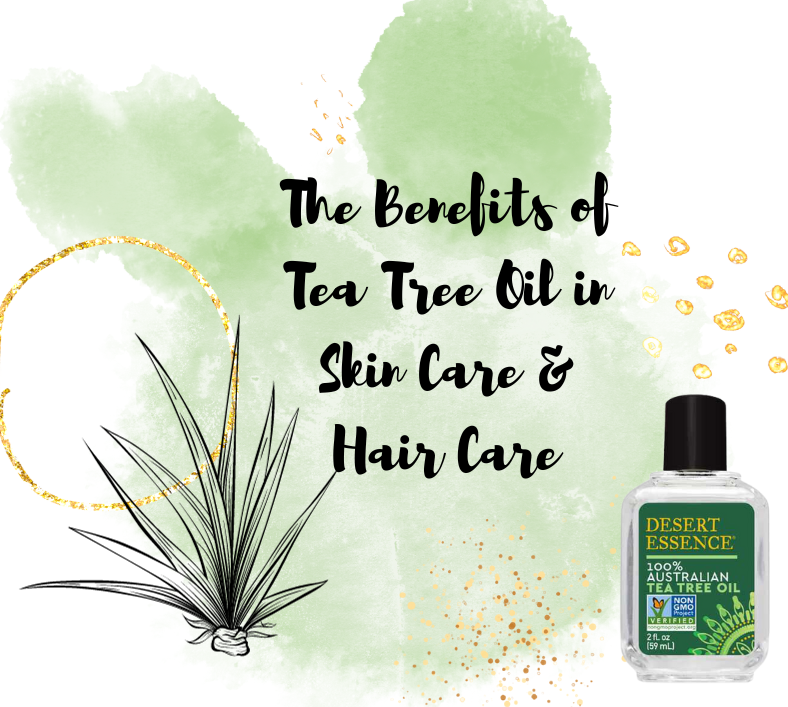Organic tea tree oil is a natural substance known for its various medicinal properties and versatile uses. Extracted from the leaves of the Melaleuca alternifolia plant, this oil possesses potent antimicrobial, antiseptic, and anti-inflammatory qualities, making it a popular choice in natural health and beauty products.
It is trusted for its ability to combat acne, soothe skin irritations, treat fungal infections, and even act as an insect repellent. With its distinct scent and powerful healing properties, organic tea tree oil is a valuable addition to any natural remedy collection.
Incorporating this pure and organic oil into your daily routine can provide numerous benefits for your skin, hair, and overall well-being.
The Origin Of Tea Tree Oil
Organic Tea Tree Oil has an ancient origin, with Aboriginal Australians using it for its medicinal properties for thousands of years. The oil is derived from the leaves of the Melaleuca alternifolia tree, known for its antibacterial, antifungal, and anti-inflammatory properties.
This versatile essential oil is widely used in natural skincare and aromatherapy.
Tea tree oil, also known as melaleuca oil, is derived from the leaves of the tea tree plant, scientifically known as Melaleuca alternifolia. This plant is native to Australia, specifically the northern regions of New South Wales and Queensland. For centuries, the Aboriginal people of Australia have been extracting the potent oil from the leaves, utilizing it for its remarkable medicinal properties. They would crush the leaves and apply the oil topically to treat various skin conditions, wounds, and infections.
The Discovery Of Tea Tree Oil
The remarkable healing properties of tea tree oil were discovered by British explorer Captain James Cook in the 18th century. During his voyage to Australia, he witnessed the Aboriginal people brewing the leaves of the tea tree plant to make a therapeutic infusion. Captain Cook, intrigued by their use of this natural remedy, named the plant "tea tree" because of its resemblance to the traditional tea plant. He also noted its effectiveness in treating scurvy among his crew members.
The Growth Of Tea Tree Oil Industry
It wasn't until the 1920s that tea tree oil gained popularity outside of Australia. It was during this time that researchers conducted scientific studies to validate its medicinal properties. The oil's antiseptic, anti-inflammatory, and antibacterial qualities were confirmed, leading to its increasing demand.
Today, the tea tree oil industry has experienced rapid growth, with Australia being the leading producer and exporter of this precious oil. The extraction process involves steam distillation of the tea tree leaves, resulting in a potent oil with a characteristic camphor-like aroma.

Credit: pharmeasy.in
Benefits For Skin Health
Organic tea tree oil provides numerous benefits for skin health. Its natural antibacterial and anti-inflammatory properties help treat acne, reduce redness, and promote a clear and glowing complexion. Moreover, this essential oil moisturizes and soothes the skin, making it an excellent choice for those with sensitive or irritated skin.
Organic Tea Tree Oil is renowned for its numerous benefits for skin health. Its powerful antibacterial and antimicrobial properties make it an effective treatment for various skin issues, while its natural composition ensures safe and gentle use.
Antibacterial And Antimicrobial Properties
Organic Tea Tree Oil's antibacterial and antimicrobial properties make it an excellent choice for promoting healthy skin. Its active compounds, such as terpinen-4-ol, have been found to fight a wide range of bacteria and fungi, inhibiting their growth and preventing skin infections. When applied topically, organic Tea Tree Oil can ward off harmful microorganisms, leaving your skin clean and protected.
Treatment For Acne And Blemishes
One of the key benefits of organic Tea Tree Oil is its ability to treat acne and blemishes effectively. Its natural antibacterial properties help to reduce the bacteria that cause acne, while its anti-inflammatory properties alleviate redness and swelling. By unclogging pores and reducing excess oil production, organic Tea Tree Oil helps to prevent further breakouts, promoting clearer and healthier skin.
Benefits For Hair Health
Organic tea tree oil is a versatile essential oil known for its numerous benefits for hair health. From improving scalp health to treating dandruff and itchy scalp, organic tea tree oil offers an array of natural solutions for maintaining healthy hair. Let's explore how this powerful essential oil can enhance the overall health of your hair.
Improves Scalp Health
Organic tea tree oil is renowned for its antibacterial and antifungal properties, making it a potent remedy for various scalp conditions. When applied to the scalp, it can help clear and unclog hair follicles, promoting a healthier environment for hair growth. The oil's antimicrobial properties can also help reduce scalp irritation and inflammation, ultimately leading to improved overall scalp health.
Treatment For Dandruff And Itchy Scalp
One of the most common uses of organic tea tree oil is for treating dandruff and relieving itchy scalp. Its natural antifungal properties can help combat the fungus that contributes to dandruff, while its soothing effects can provide relief from scalp irritation and itchiness. The oil's cleansing properties also help remove impurities and build-up on the scalp, addressing the root causes of dandruff and itchiness.

Credit: www.amazon.com
Different Ways To Use Organic Tea Tree Oil
Organic tea tree oil is a versatile essential oil that offers numerous benefits for both your body and hair. This natural remedy has gained popularity in recent years due to its antibacterial, antifungal, and anti-inflammatory properties. With its wide range of uses, incorporating organic tea tree oil into your daily routine is a smart and beneficial choice. In this article, we will explore the different ways you can use organic tea tree oil to improve your beauty and well-being.
Topical Application
One of the most popular ways to use organic tea tree oil is through topical application. This essential oil can be applied directly to the skin to address various skin concerns. Its antibacterial and antiseptic properties make it effective in treating acne, blemishes, and skin infections. Simply dilute a few drops of organic tea tree oil with a carrier oil like coconut or jojoba oil and apply it to the affected area using a cotton pad or your fingertips. This can help reduce redness, inflammation, and promote faster healing.
Incorporating Into Haircare Products
If you're looking to enhance the health of your hair and scalp, incorporating organic tea tree oil into your haircare routine is an excellent choice. This essential oil has natural antifungal properties that can help combat dandruff and soothe an itchy scalp. You can add a few drops of organic tea tree oil to your shampoo or conditioner and mix it well before applying. The oil will help to cleanse the scalp, remove excess oil buildup, and promote healthier hair growth.
Additionally, organic tea tree oil can be added to your regular hair treatments, such as hair masks or scalp massages. For a nourishing hair mask, mix a few drops of organic tea tree oil with coconut oil and apply it to damp hair. Leave it on for 30 minutes before rinsing thoroughly. This will help moisturize your hair, restore shine, and improve overall scalp health.
Summary
As you can see, there are several ways to incorporate organic tea tree oil into your routine, whether it's through topical application or adding it to your haircare products. By harnessing the power of this natural essential oil, you can enjoy its numerous benefits for the skin and hair. Experiment with different applications and find what works best for you and your needs. Discover the wonders of organic tea tree oil and unlock its potential for a healthier and more radiant you.
Safety Precautions And Considerations
Safety Precautions and Considerations:
Dilution Guidelines
When using organic tea tree oil, it is important to follow proper dilution guidelines to ensure safe and effective use. Tea tree oil should never be used undiluted on the skin, as it can cause irritation and adverse reactions. It is recommended to dilute tea tree oil with a carrier oil, such as coconut oil or olive oil, at a ratio of 1-2 drops of tea tree oil per tablespoon of carrier oil.
Potential Allergic Reactions
While organic tea tree oil offers numerous benefits, it is crucial to be aware of potential allergic reactions that some individuals may experience. Before using tea tree oil, it is recommended to perform a patch test on a small area of skin. Apply a diluted mixture of tea tree oil and carrier oil to the inner forearm or behind the ear and wait for 24 hours to check for any adverse reactions. If any redness, itching, or discomfort occurs, discontinue use immediately.
It is worth noting that tea tree oil should never be ingested, as it can be toxic when taken internally. Additionally, avoid direct contact with the eyes or sensitive areas. If accidentally ingested or contact with the eyes occurs, seek medical attention immediately.
Overall, organic tea tree oil is considered safe when used properly, but it is always wise to exercise caution and take necessary precautions. If you have any concerns or existing skin conditions, it is advisable to consult with a healthcare professional before incorporating tea tree oil into your skincare routine.

Credit: www.desertessence.com
Frequently Asked Questions Of Organic Tea Tree Oil
What Are The Benefits Of Organic Tea Tree Oil?
Organic tea tree oil offers various benefits, including its natural antiseptic properties, ability to fight acne, soothe skin irritations, and promote scalp health. It can also be used as a natural deodorant, relieve congestion, and alleviate dandruff symptoms.
How Do I Use Organic Tea Tree Oil For Acne?
To use organic tea tree oil for acne, dilute a few drops with a carrier oil and apply it to the affected area using a cotton swab. Leave it on for a few hours or overnight before rinsing it off.
Regular use can help reduce inflammation, kill acne-causing bacteria, and promote clearer skin.
Is Organic Tea Tree Oil Safe For Sensitive Skin?
Organic tea tree oil can be safe for sensitive skin, but it's important to dilute it properly. Start by mixing a few drops with a carrier oil like coconut or jojoba oil. Perform a patch test beforehand to check for any adverse reactions and avoid applying undiluted tea tree oil directly on sensitive areas.
Can Organic Tea Tree Oil Be Used For Hair Care?
Yes, organic tea tree oil can be used for hair care. Add a few drops to your shampoo or conditioner to help control dandruff, soothe an itchy scalp, and promote healthy hair growth. However, it should be used in moderation and diluted properly to avoid any scalp irritation.
Conclusion
Organic tea tree oil offers a natural and effective solution for a range of skin and hair ailments. With its anti-inflammatory and antimicrobial properties, this versatile oil is a must-have for any beauty and wellness routine. Its soothing and purifying benefits make it a popular choice for those seeking a holistic approach to skincare and hygiene.



